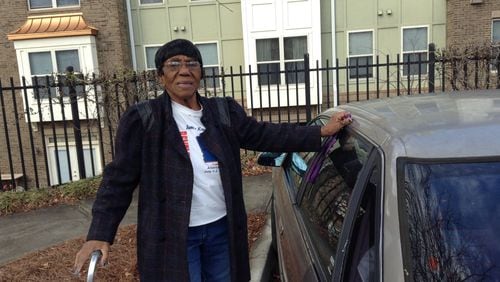Dr. Ted Johnson is on the Georgia Older Driver Task Force. He offers tips for families of older drivers to determine if it’s time for a loved one to turn in the car keys:
- Look for unexplained dings and dents in the car.
- Is the driver often lost, even when going to familiar places?
- Do other family members feel uncomfortable riding with him/her?
- Have the neighbors reported erratic driving habits such as hitting the curb or running over trash cans?
- Does s/he have difficulty making left turns?
For more tips, go to dph.georgia.gov/older-drivers-program
It’s no secret that Atlantans love their cars. My great aunt, Ruth Butler, is no exception. She’ll turn 99 in April, and when the mood strikes, she gets behind the wheel of her ’89 Ford Taurus and hits the road.
“I like to think God is my co-pilot,” said the eldest and only surviving sibling of six children. “In my 60-something years of driving, I’ve never broken down or been stranded. I’ve always got where I needed to be in one piece.”
Widowed nearly three decades ago, Aunt Ruth lives alone in a senior facility near Clark Atlanta University. She has been independent since she moved to the state capitol when she was about 20. Up until a few years ago, she’d head down Interstate 75 to visit friends and relatives in her hometown of Thomaston and nearby Barnesville, both in south Georgia.
And if the thought of a near-centenarian at the wheel makes you quake, well, get used to it.
One in 10 of Georgia’s 6.3 million holders of valid licenses are over 70, according to the state Department of Driver Services. That number will surge as baby boomers age. The over-80 population is projected to triple by 2050.
Old folks are also driving more than they once did; their average mileage grew by half from 1995 to 2008. The good news is, they’re getting better at it.
A recent study by the Insurance Institute for Highway Safety found that elderly drivers are less likely to be involved in crashes than prior generations. They’re also less likely to be killed or seriously injured if they do crash. That’s true for most age groups, but it’s much more pronounced among drivers on the far side of 70.
“This should help ease fears that aging baby boomers are a safety threat,” said Anne McCartt, the Institute’s senior vice president for research and a co-author of the study. “Even crashes among the oldest drivers have been on a downswing.”
She said many seniors are self-regulators. “They’ll often limit their driving to daytime or stay off freeways and interstates.”
Dr. Ted Johnson, chief of the division of general medicine and geriatrics at Emory University’s Woodruff Health Sciences Center, sees plenty of elderly patients who can function fine on the road. Others, not so much, he said. If you were a bad driver in your earlier years, you won’t miraculously become a safe driver once you hit 70.
Johnson said his own grandfather had a habit of straddling the yellow line and complaining about how rude other motorists were when they’d honk at him in warning.
“We still need to evaluate individuals on a case-by-case basis,” he said. “There will be serious consequences if we don’t.”
Last year Aunt Ruth had to renew her license. She was concerned that she’d be denied since she was well past her prime.
“I walked into the DMV prepared to hand over my license,” she said. “I figured I’d had a good run, but it was about to be over.”
To the contrary, the staff was amazed at Aunt Ruth’s vivaciousness and doubled-checked her records to make sure she really was as old as she claimed.
(However, Georgia is among states that place special requirements on older drivers. Licenses must be renewed in person every five years for those over 60.)
As she gets closer to the century mark, Aunt Ruth also worries about her auto insurance rates. “It won’t be worth having a license if I can’t afford the insurance,” she said.
Although insurance companies don’t share the formulas they use to calculate rates, there are a lot of factors involved. Age is just one of them.
“While this study is good news” for older drivers in general, “auto insurance companies are more likely to look at the individual record,” said Michael Barry, vice president of media relations for Insurance Information Institute, an national industry organization with a mission to improve public understanding of how insurance works.
Bottom line, Barry said: As long as an individual has a license, there’s probably a company that will insure them.
When she heard that, Aunt Ruth let out a sign of relief.
“When you get to be my age, you pretty much take it one step at a time,” she said. “If I’m still driving when I’m 100, that will be something, but if I don’t think I’m up to it, I’ll hand over my keys.”







